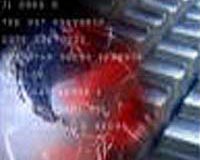| . |  |
. |
Washington (UPI) Jun 24, 2009 U.S. Defense Secretary Robert Gates on Tuesday ordered the Pentagon to set up a military cyber-command to defend its computer networks against the mounting number of attacks and to develop its own cyber-weapons. In a memo, Gates told military leaders that the command should be led by the National Security Agency under its current director, Lt. Gen. Keith Alexander, as part of U.S. Strategic Command, which directs computer and nuclear warfare operations. The decision follows growing concerns over the vulnerability of computer technology as it takes on an increasing role in military operations. U.S. war doctrine now prioritizes dominance in cyberspace, which Alexander described as the new national security frontier, similar to sea and air power. The technology available to the United States remains super secret, but the U.S. Department of Defense relies for its operations on 7 million computers and info-tech devices on 15,000 electronic networks. They come under constant attack. According to the Pentagon, more than 100 foreign intelligence services have tried to hack into U.S. networks. "Our defense networks are constantly probed. There are millions of scans every day. And the frequency and sophistication of attacks are increasing exponentially," said Deputy Defense Secretary William Lynn. "The power to disrupt and destroy, once the sole province of nations, now also rests with small groups and individuals, from terrorist groups to organized crime to industrial spies to hacker activists, to teenage hackers," he said. A large number of attempted intrusions have been traced back to China, which U.S. officials say has developed a cyber-warfare program. A large number of attacks have also originated from Russian sources. Hackers have reportedly breached the computer networks of contractors building the F-35 stealth fighter plane. And U.S. troops and civilian staff were banned from using external memory drives after thousands of Defense Department computers were infected by malicious software. The command will likely be located at Fort Meade, Md., and is scheduled to begin in October and be fully up and running by October 2010. Trying to downplay concerns that the new command may snoop on civilians, the Pentagon stressed that the developments would only have military applications and that it would not be taking over security efforts for civilian networks from other government agencies. "This is an internal reorganization," said Air Force Lt. Col. Eric Butterbaugh, a Pentagon spokesman. "It's about the department improving its focus on military networks to better consolidate and streamline (Pentagon) cyber capabilities into a single command." The Pentagon has thousands of staff directly involved in cybersecurity, and Gates plans to graduate some 200 officers annually. Share This Article With Planet Earth
Related Links Cyberwar - Internet Security News - Systems and Policy Issues
 US cybersecurity chief warns of 'market' in malware
US cybersecurity chief warns of 'market' in malwareWashington (AFP) June 16, 2009 More must be done to combat the lucrative trade in malicious software, which threatens sensitive government networks and personal data, the head of the US National Cybersecurity Center warned Tuesday. In his first interview since taking up the post in March, Philip Reitinger told AFP the spread of so-called malware like botnets -- software that hijacks computers to mine sensitive data ... read more |
|
| The content herein, unless otherwise known to be public domain, are Copyright 1995-2009 - SpaceDaily. AFP and UPI Wire Stories are copyright Agence France-Presse and United Press International. ESA Portal Reports are copyright European Space Agency. All NASA sourced material is public domain. Additional copyrights may apply in whole or part to other bona fide parties. Advertising does not imply endorsement,agreement or approval of any opinions, statements or information provided by SpaceDaily on any Web page published or hosted by SpaceDaily. Privacy Statement |